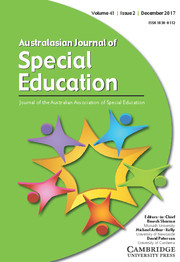No CrossRef data available.
Article contents
Connecting to Community: What Do We Want in Our Special Education Graduates?
Published online by Cambridge University Press: 02 March 2012
Abstract
With a commitment to establishing collaborative relationships with a local special education community, a consultation process was undertaken to ascertain what practising educators considered essential special education graduate characteristics. This consultation occurred against the backdrop of broad-scale university organisational restructure, faculty level program redesign, and the reported lack of an empirical basis for special education teacher attributes as distinct from general teacher education attributes. Special education professionals in a regional Australian city were invited to participate in two workshops to generate and analyse the qualities they considered essential for graduates of special education teacher preparation programs. The attributes identified by participants as essential were in agreement with many of those identified in the literature, yet behaviour support and resilience, which are typically subsumed within other categories in the literature, featured as stand-alone areas in this study. The processes and outcomes described in this article are discussed in relation to the potential value of special education teacher attributes for the field, and establishing a bridge across the perceived gap between the field and universities.
- Type
- Conference Papers
- Information
- Copyright
- Copyright © Cambridge University Press 2010


